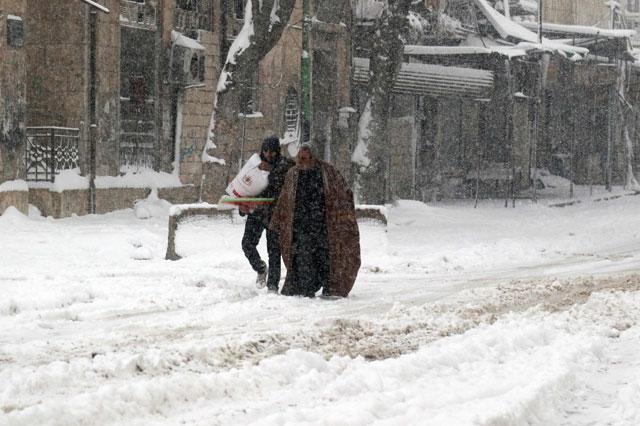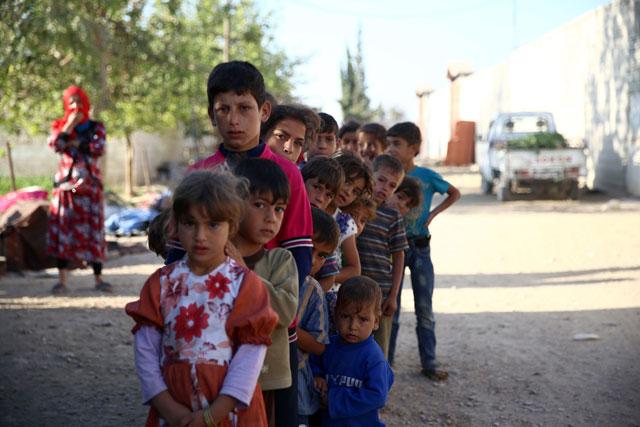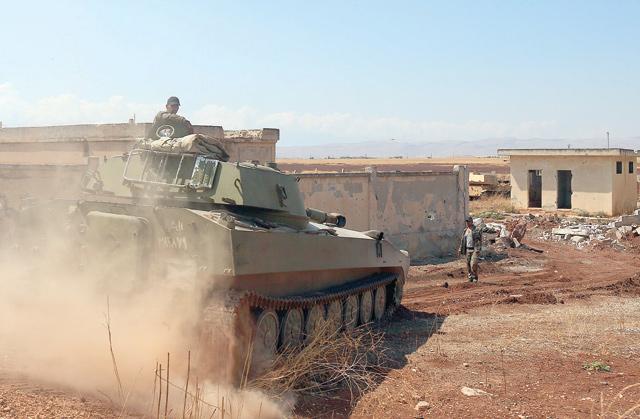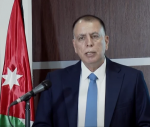You are here
In Idlib, displaced Syrians bemoan ‘open-air prison’
By AFP - Dec 21,2016 - Last updated at Dec 21,2016

Syrians walk in a snow covered street in the town of Maaret Al Numan, in Syria’s northern province of Idlib, on Wednesday (AFP photo)
IDLIB, Syria — Tens of thousands of displaced Syrians say they have become trapped in an “open-air prison” in the northwestern province of Idlib which they fear will be the army’s next target.
Rebels and civilians who have sought refuge in the opposition-held province, most recently from second city Aleppo, say they are suffering from skyrocketing prices and overpopulation.
At least 25,000 people, including rebel fighters, have left East Aleppo since Thursday under an evacuation deal that will see the city come under full government control.
Many of them have headed to neighbouring Idlib province to stay with relatives or in displacement centres.
“We did not want to leave our land, but they used every weapon available to force us out,” says Abu Mohammad, a father of four from East Aleppo.
“Now they’ve prepared a prison for us in order to besiege us and bombard us,” he adds, speaking to AFP in a camp hosting around 100 displaced families.
Idlib city has been held since March 2015 by a coalition of rebels led by the Islamist group Ahrar Al Sham and the former Al Qaeda affiliate Fateh Al Sham Front.
Since then, tens of thousands of people from across the country have flooded the province.
The UN office for humanitarian affairs, OCHA, estimates that 700,000 internally displaced people have found shelter in Idlib since Syria’s war erupted nearly six years ago.
‘Tough’ life in Idlib
Many of those displaced to Idlib are fleeing government bombardment or evacuating besieged areas under local deals with the regime.
These “reconciliation” agreements typically see rebels and civilians bussed out of a town in exchange for an end to shelling or siege by government troops.
In addition to Aleppo, six other towns near Damascus have been evacuated in the last several months, including Daraa and Moadamiyet Al Sham.
The influx to Idlib has had an overwhelming effect on everyday life, with the cost of rents and basic food skyrocketing and shortages becoming a common reality.
Abu Yazan Al Ramah, a fighter who arrived in April from the besieged rebel town of Zabadani near the Lebanese border, says living in Idlib was “tough”.
“It’s expensive. There are some things you can’t find or at times they are unaffordable,” says the 30-year-old who has joined up with a local rebel group in order to survive.
Continuing to work with rebel groups is often the only way that displaced men can secure shelter or food.
According to Abu Zeid, a rebel who was wounded near Damascus, armed groups often provide newly displaced fighters in Idlib with free housing, clothes, food “and sometimes money”.
Even local business owners in Idlib are struggling to respond to the soaring needs.
“The population increased and so has demand,” says grocery shop owner Jalal Al Ahmad.
Ahmad says he buys his merchandise mainly from neighbouring Turkey but admits that when he is stuck, he gets supplies from regime-held areas.
“It is much more expensive to buy from regime-held areas,” says Ahmad, lamenting the rising cost of basic products such as rice, sugar, tea, cooking oil and eggs.
‘Like the Gaza strip’
With the new arrivals, he fears Idlib is being turned into “a massive prison, an open-air prison, that can be shut down at any time”.
“And if it does, it will be like the [Israeli blockaded] Gaza Strip and the regime will begin to eliminate us,” Ahmad adds.
Other locals, including wealthy realestate owner Nasser Alloush, agree.
The 49-year-old from the village of Binnish says that property values are rising as more people are displaced to Idlib.
“The regime wants to gather the revolutionaries and their opponents in one place in order to hit them with one blow,” Alloush says.
Concerns that Idlib could be the regime’s next target are not new, but they have been rising.
As early as December 2015, months after Moscow began its air campaign in Syria, a security source in Damascus said Russian and Syrian forces have been holding joint training exercises to prepare for fighting in Idlib.
“In the next stage, Idlib will become the major destination and most important target of joint Russian-Syrian military operations,” the source said.
In October, Assad said he would use a victory in Aleppo as a “springboard” to capture other rebel strongholds, suggesting Idlib could be next.
“It’s going to be the springboard, as a big city, to move to another areas, to liberate another areas from the terrorists,” the Syrian president said.
UN Envoy Staffan de Mistura warned last week that Idlib is now at risk of a similar escalation of violence as Aleppo.
“If there is no political agreement and a ceasefire, Idlib will become the next Aleppo,” he said.
Related Articles
BEIRUT — Syrian and Russian warplanes have launched a wave of air strikes in northern Syria, killing dozens in areas held by a rebel allianc
KAFR NURAN, Syria — Artillery strikes by the Syrian army killed three civilians including a child on Wednesday in the last major rebel
BEIRUT — The Syrian army took full control of the key northwestern town of Khan Sheikhun on Wednesday, surrounding Turkish forces at a nearb

















